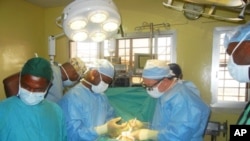Although fighting ended in Liberia in 2003, the country remains on a long road to recovery from civil war. Poverty, a lack of development and little health care are among the challenges facing the government. But a group of volunteer surgeons has visited this week Liberia to provide services rarely seen in that country.
The team of surgeons from Project Hope spent several days at Phebe Hospital in Bong County. That’s north of the capital Monrovia.
No surprises
Dr. Jonathan Laryea, who led the medical team, says they were not surprised by what they found.
“We had done some background checks on what was going on in Liberia. And so, we kind of had a pretty decent idea of what to expect. And then secondly, an advance team came in. two of us came in earlier, to make kind of an assessment before the rest of the team came in,” he said.
Liberia’s civil war took a heavy toll on civilians, infrastructure and social services, including health care.
“They have very few medical personnel in this country. I think the long period of civil war just decimated the country. Most of the doctors that were already here left. And then for that prolonged period of time of the war they were not training new doctors and any new medical personnel. And so that has really made it a very difficult situation for them in terms of health care,” he said.
He estimates there are fewer than 10 surgeons in a country of 4 million people. The statistics are similar for other medical specialties, as well.
In the OR
Laryea and the Project Hope team performed many surgeries at Phebe Hospital, but he says he just can’t remember how many. He gives a few examples.
“Removing large goiters, some of which were pretty complicated. We did a bunch of hernias. We operated on a trauma patient and a Crohn’s disease patient. And then we did a complex uteral reimplantation surgery on somebody who had had a fistula as a result of childbirth,” he said.
Obstetric fistula is a tear or hole between the birth canal and the bladder or rectum that results from prolonged or difficult labor. Left uncorrected, the woman is unable to control her urine or bowel content. She is often shunned by her family because of the constant odor.
Following the surgeries, the doctors also instructed Liberian medical students. It’s part of the effort to help rebuild health infrastructure. It’s estimated the country has only one hospital bed for every 1,000 people in the country.
Project Hope, which is based in the U.S. state of Virginia, has been providing humanitarian assistance since 1958. It has programs in more than 35 countries.




